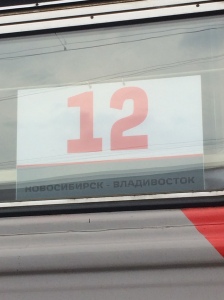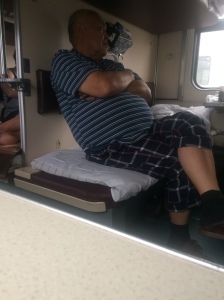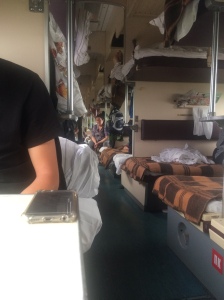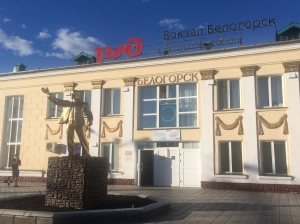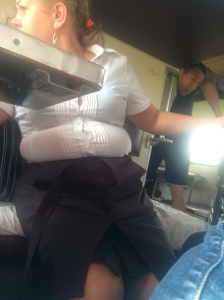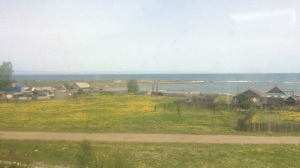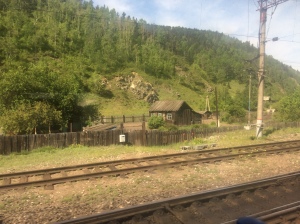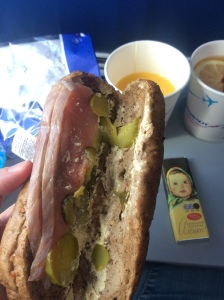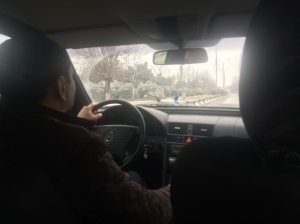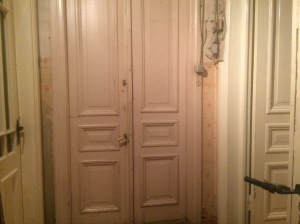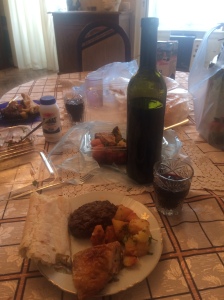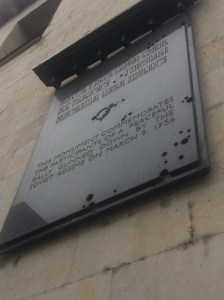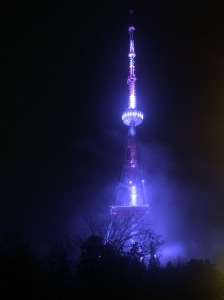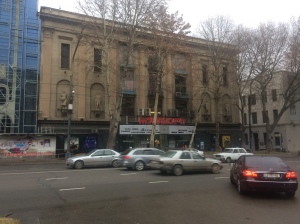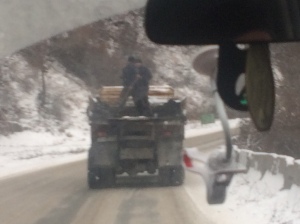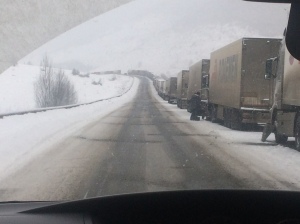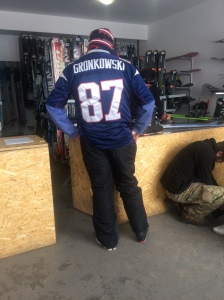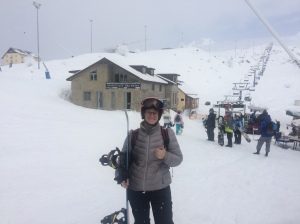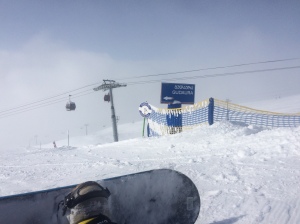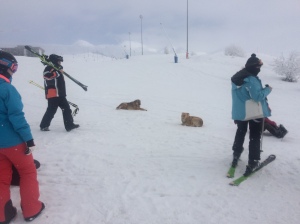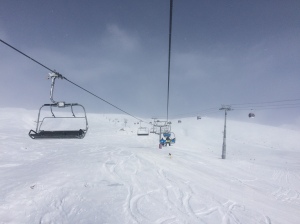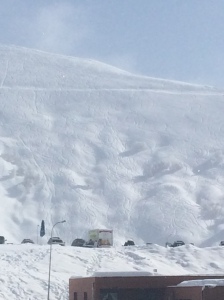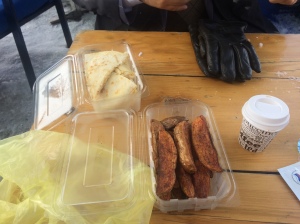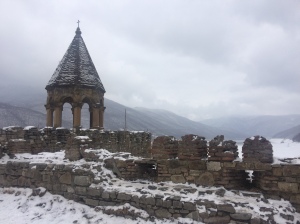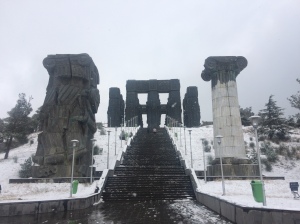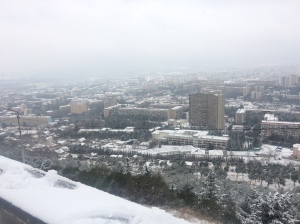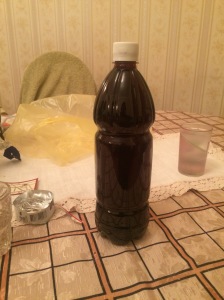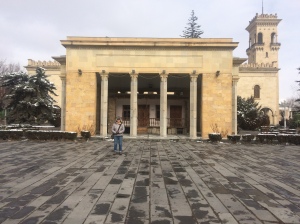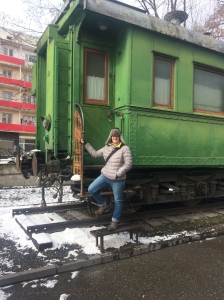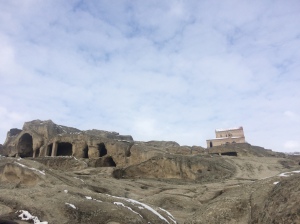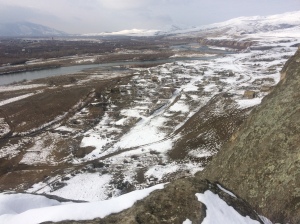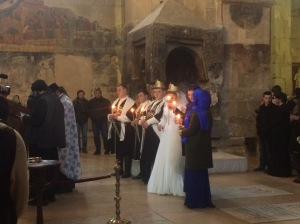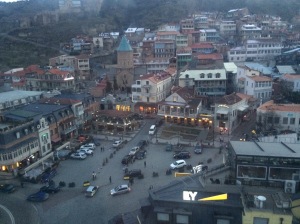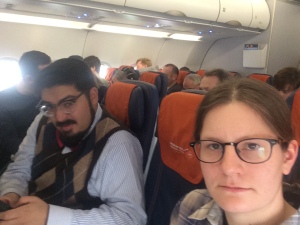Just before 8:30AM on Wednesday June 7th, I walked to the Khabarovsk train station to undertake the longest leg of my Trans-Siberian journey. I would be on the train for roughly 58 hours. For this jaunt, I was on train 007 – Vladivostok-Novosibirsk. While waiting at the platform, a 20-ish student approached me and asked if he was in the right place for his train. He was French, spoke somewhat broken English, and zero Russian. He was indeed in the correct place, and it turns out that he had the bed above mine in the train. His name was William. He had some time off from university, and he decided to take the Trans-Siberian and make some stops along the way. His grandfather had done it the year before, so that was one of his motivations to take the trip. We would be together on the train for 50 hours, until he got off at Ulan-Ude, a stop that I wanted to make but didn’t have time for as my trip was already 16 days long.
As we got to our area, we met out other traveling companions. The person with the lower berth across from me was a 70 year man named Boris. He was traveling from his home of Khabarovsk to Ulan-Ude to visit some relatives. When William and I got to our spots in the train, Boris was sitting with his wife. They both sighed in relief when they found out that I spoke Russian. Boris’s wife was not going with him, though, she was just saying goodbye to him. In Russian trains, it’s common for people seeing you off to walk into the train and help you get your things settled at longer stops. The conductors allow this, and a few minutes prior to departure, the conductors walk through the carriage telling those accompanying passengers to leave the train. Boris was quite the character, and he made sure my time passed quickly on the train.
Above Boris was Ulugbek from Kyrgyzstan. He had been in Korea (which Korea was slightly unclear) on a work contract. Ulugbek was an engineer who works in hydroelectric stations. He was riding on the train from Vladivostok to Krasnoyarsk. I was worried because we got onto the train already 13 hours into its journey, and Ulugbek had an unrefrigerated rotisserie chicken that he proceeded to eat over the next two days. He was also very friendly and pleasant company.
Along the window there was a 20-ish girl who was a student at Far Eastern Federal University, who was riding back home for the summer. I forget where exactly she got off, but it was towards the evening of the first day. She had to switch trains to ride to some smaller city called Tynda. She was asleep most the day that we were with her, and she didn’t say anything to us, though she did tell Boris she was a student and going to Tynda.
The train itself was pretty nice. It was the newest style of older carriages. The bottom bunks had padding for your back when you were seated, and I had the coveted spot in the carriage that had an outlet. In the older trains, not every spot has an outlet. Usually the second series of berths on each side have one outlet. Then, there is usually an outlet by the toilets at either end. I didn’t have to worry because I could change my phone whenever I wanted, but others in the carriage took turns standing by the toilets and watching their phones. Others just decided to chance leaving their phones by the toilets. On our longer train, we had police officers patrolling the carriages, and at times they would ask whose phone was being charged as a reminder to look after ones belongings. The carriage we were in didn’t have air-conditioning, or if it did, it was broken. Thankfully, our window opened. And, unlike the older trains, these newer carriages have LED displays at both ends of the carriage that display the Moscow time, the temperature in the train, and whether or not the toilet is free.
Although my ride to Irkutsk was long, it wasn’t bad. I alternated my time in the train talking to my companions and reading. The train also makes a few longer stops each day, and in the Russian Far East, villagers have created their own small businesses around the train schedule. They know when the long-haul trains make stops and line up near the station to sell provisions.
In Belogorsk, for example, I managed to buy a hardboiled egg, some potato vareniki, and a local fish called harius. I opted to go for hot smoked, which leaves the flesh pliable and soft as opposed to cold smoked, which dries out the fish and almost turns it into jerky. The meal was scrumptious. While at the stop, a man selling fish looked at me and turned to the woman with the eggs and vareniki and said in Russian, “Do you speak English? You better.” I responded that I speak Russian, and they were happy.
I then had a discussion about the differences in fish smoking techniques. I also had to help William buy food as he couldn’t communicate with the people at all. After we ate our food, I watched in horror as Ulugbek added a large quantity of unrefrigerated mayonnaise to his bowl of ramen. The standard train foods for these journeys are sunflower seeds, a Russian pastime, and either instant noodles or potatoes. Every Russian train carriage has a water boiler for tea and food.
Most of my entertainment from the train ride came from talking with Boris over the first two days. I spoke a little with William, but his English was bad, which limited our conversations. Boris was a bit of a provocateur, and was full of lots of interesting information about Russia. He constantly spoke in a weird slang, and refused to ever use common words to explain himself. He asked me if I heard about what to say if someone asks if you want a brick in Vladivostok. Apparently, this is a petty form of extortion. The person being asked is to respond, “how much?” and then pay said amount, otherwise they will be beaten and robbed. Apparently, there are lots of similar tactics on Russian roads in the Far East. Often, people will just sit on the side of the road and say they don’t have gas, or will try to sell you gas. Sometimes, they’ll leave something on the road for you to stop and grab. In all of these situations, I was told to never stop. However, if stopped, it’s always best to pay what amounts to the bribe. Finally, when traveling on Russian roads, it’s good to have a weapon in your car trunk. Boris was once stopped by a group. One guy talked to him while another searched his trunk. They both left him alone after the one who opened the trunk found a large machete. This also partially explains the wooden mace that the government chauffeur in Ulyanovsk had in his car trunk.
Between teaching me about how to survive in Siberia, Boris spent time provoking me and those around us in the train. We discussed Russian history at one point. He was angry that I didn’t know a word or two about tributes during the Mongol conquest of Russia. I said that my specialty was Soviet history. He said that it wasn’t an excuse, that instead my program was probably weak or that I was lazy. I responded that I don’t have time to read about early Russian history in depth because I have to spend my time reading about the Soviet Union and other history. This then caused Boris to launch into a lecture about how I have time because I do not work on a kolkhoz, a form of village based Soviet collective farm. Had I lived in a kolkhoz, he said, I would truly not have time. I would have to wake at 5:00AM to feed the chickens and milk the cows, make breakfast, wake the children, “pat [my] husband on his head,” and send everyone off before doing my assigned labor task on the farm for the day. This then caused Boris to lecture about American women. He wanted to know why it was acceptable to go shopping in house clothes or sweat pants. In his mind, women need to dress up to buy groceries or run simple errands. In his eyes, a woman should always be made up and strive her best to visually please the men around her. That was a fun conversation, and one of many of different cultural views about the gender roles and marriage ages in America versus Russia along the train ride.
At one point, when William and I were speaking in English, we caught the attention of two young girls in the train. One asked what we were speaking, and was surprised when I said English. She said she studied English, but refused to say anything to me from being shy. Eventually, she told her mother about us, and then her mother came to talk with us. Boris then began to provoke the mother and said that her daughter didn’t speak any English because she refused to say anything to me. Boris then proposed English lessons on the train. He said he was the director of the school and would get 70% while I would get 30% of the proceeds. When asked why the cut was so large, Boris cheekily responded, “because I’m here getting you work, while you’re being lazy and just reading books.” He then said that lessons would begin promptly at 8:00AM the next morning. I groaned about the early hours, and he laughed. Although Boris liked to poke fun at people or stir up trouble, he was truly a nice man. One night, he noticed that I had gotten cold while sleeping and got a blanket for me.
Boris was also immensely entertaining because he somewhat befriended the lady who walks through the train selling food and drinks. He offered all of us, plus her, some food and drink. She accepted the offer, and would sit down with us when she passed us by. She affectionately called him “ded,” basically, “gramps.”
One of the interesting experiences on the train was with the police. They extensively patrol the trains in the Far East. At times they were doing document checks, but they never asked us for our documents. I have rarely seen the police on trains in Russia. I have only on one occasion seen them on one of the trains between Moscow and Ulyanovsk, and they asked for my documents then. I remember being confused, and the older woman in the kupe with me said that it was nothing to worry about and normal. They did a little more on this train, though. On the second full day on the train, we stopped at a small place called Mogocha. About fifteen minutes after leaving the station, the police walked through our carriage with a man in handcuffs. There was one cop in the lead and there were two behind. The second cop had his hand on the back of the man’s neck/head, forcing it down. The man’s hands were tightly cuffed behind his back, and he was bent over and walking in a stress position. The third cop was carrying the man’s bag. Boris said that he had never seen that before in all of his years riding the train. He seemed to think that the man had tried to ride on the train without a ticket, but from a conversation I had just before getting off the train in Irkutsk, it seems that the man might have been belligerently drunk. He was hauled off of the train when we stopped in Chernyshevsk.
Also on this day, as we rolled through some middle of nowhere part of Siberia, it began to snow. I had not expected to see snow that south in Siberia in June. It was crazy.
On the second day, the girl had gotten off of the train, and no one new joined our area. This meant that we could sit at the two smaller window seats when we pleased. At one of these periods, William’s passport fell out of his pocket, which caused me to have a discussion with Boris about Russian passports versus American or European ones. Russians have two kinds of passports, internal and external. The external passport is just like ours and is used for leaving the country. The internal passport serves the function in Russia that our driver’s licenses do, basically, and then some. They include information about birth and age. They also include where the person is registered to live, marital status, and information about children. While talking to Boris, a man in the next berth over noticed that I was foreign and began to speak with me. Andrei was a sailor who works on large freight ships. He was traveling from just outside of Vladivostok, Nakhodka, to see his children in Irkutsk, where he had grown up. Andrei was very friendly and went on long rants about the divisions within Russia between Moscow and Siberia. In his opinion, Moscow steals everything from Siberia and gives nothing back. Boris at one point was jealous that Andrei was taking over as the one to tell me tales about Russia and told Andrei that I probably didn’t understand what he was saying. What Boris didn’t know was that I understood Andrei’s slang better than has because Andrei used simpler words and words that I was familiar with.
In the morning of the second day, when we made our “breakfast” stop, Boris told me to buy something called “сера” (sera), which is a Siberian gum. It’s made from tree sap/rubber. It tastes like chewing a mixture of a pinecone and a rubber band. I can’t say I super loved it, but it did make my mouth feel cleaner around sporadic trips to the somewhat gross toilet to brush my teeth. You buy sera by the stick. I got one. Others bought bushels of them. Apparently, it’s only common to buy in the Far East.
As the train carried on across Siberia, I alternated between reading and staring out of the window. I had heard someone describe the Trans-Siberian as “the greatest Russian novel ever written.” I’m not sure where I heard this, but I agree. It was easy to spend hours just looking out of the window, watching the scenery change. You would fall asleep and wake up in what looked like a completely different country as the geography and vegetation would change drastically. The temperature also fluctuated between hot, comfortable, and downright cold. At one point, the provodnitsa walked through the car and asked if we were cold and if they should turn the heat on. They were taking a poll of the passengers and their comfort level. I said I was fine and just put on a warm shirt. Thankfully, they didn’t turn the heat on. The villages that came and went along the rail lines were fascinating to look at. Although some of them looked a little rough, none of them looked totally rundown. There is clearly poverty in Russian villages, but they don’t look like war zones like some of the places I’ve seen in ex-Soviet republics. I now really want to find a way to spend at least a day or two in an actual Russian village.
Another interesting part of riding through the Siberian wilderness was looking at the cars. The number of vehicles in the villages was pretty small, but almost every settlement had either an UAZ Bukhanka, UAZ 469, or a Lada Niva. Ulyanovsk pride for Siberia! On the whole, cars in Siberia were interesting to observe. Most of the cars in Vladivostok were right-hand drive, brought in from Japan. As you ride across back towards Moscow, the percentage of right-hand drive cars shifted from about 90% to 40%. I suppose the Urals are the dividing line for this trend. In European Russia, it’s possible to find a right-hand drive, Japanese import car, but it’s rare.
After Boris and William got off in Ulan Ude, I spoke with Andrei quite a lot on the leg from Ulan Ude to Irkutsk, an additional 8 hours on the train. This was the best part of the trip because we spent most of it riding along Lake Baikal, and the view was mesmerizing. Andrei gave me tips for what to see or do in Irkutsk and told me the history of the area and the Angara River. He also gave me his phone number and said that he would be glad to show me around the Vladivostok area should I wind up there again.
Just about two hours before Irkutsk, the train made a stop in a place called Slyudyanka, and a man of about thirty got on and took what had been Boris’s space. He was nice and well prepared for the long train ride. He had brought a combination strip outlet/extension chord with him to power his laptop. He offered some of his snacks, and asked if I wanted to watch a movie. I declined as I was getting off of the train soon and had to gather my things. At that point, another guy came into the area and asked Andrei where the foreigner was. He said that he was in another car with a French guy, “from Brussels.” I told him that Brussels was in Belgium. He said, “Whatever. He speaks French and English. I don’t speak much English. Please come and translate for him and two other foreigners.” The new guy next to me asked why I had to do that. The strange man said that the others around them in the carriage also didn’t speak English, and that most of the others around them were foreigners, like my neighbor, and spoke Russian with an accent. My new neighbor then got angry and said, “What do you mean foreigners like me and what accent?” The guy responded that he was clearly from a different country. The neighbor responded that he was born and raised in Irkutsk, and that his family was from Dagestan, which is part of Russia. The weird guy again said whatever and ushered me off with him.
We walked into the next carriage and I met the Belgian guy, who was named Arthur. He was talking with two Italians who were going home from an 11 month trip around the world. Both Arthur and the Italians were on the train for the sake of saying that they had done the Trans-Siberian. They were all riding from Vladivostok to Irkutsk, stopping in Irkutsk to see Baikal, and then going from Irkutsk straight to Moscow. I chatted briefly with them and then went back to gather my things. Andrei and my new neighbor wanted to know what was going on, and I said the strange guy was just drunk and that there was no need to go off and talk to the others. However, when I got off the train, I did end up sharing a taxi with Arthur, who must have been some sort of rich Belgian playboy or trust-fund guy. He talked about having spent the past three months in Asia. He also had an American Express Platinum card in his wallet. His hostel was near the one where I was staying, so I figured it would be ok to grab a cab with him. We took a Yandex taxi for under 100 rubles, which was funny because the taxi driver asking if we wanted a ride quoted 500 rubles for the same ride, and I just laughed in his face.
